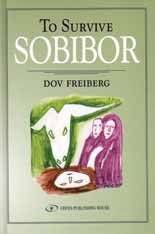To Survive Sobibor - Book Review
Gefen Publishing House.
Hard cover. 628 pp. ISBN 978-965-229-388-6.
NIS 100.
Reviewed by Carl Hoffman
I have stated, in a number of book reviews that have appeared in these pages, that all books about the Holocaust are valuable. I have declared that any Holocaust story should be recorded, published and read by as wide an audience as possible. I have even implied that Holocaust books that aren't terribly well organized or skillfully written are to be treasured as memorials to the murdered six million and testaments to one of the darkest chapters in human history. For throughout those years of horror, among the last words of those who were about to die was the demand that the living bear witness and tell the world what happened to the martyred Jews of Europe. Any book about the Holocaust that does this is priceless and important. Dov Freiberg's massive memoir, To Survive Sobibor, is however in a class by itself. Not only is this a major, almost epic personal narrative of the Holocaust but a superb book as well. The story is well-written, in a simple but compelling style that grabs the reader on page one and doesn't let go. As a narrative, the book is virtually a capsule history of the Holocaust. The author's experiences begin - at the tender age of twelve - with the German invasion of Poland; proceed through the months of increasing harassment and persecution of Poland's Jews; and grimly continue through life in the Warsaw Ghetto, internment at the dreaded Sobibor death camp, escape from Sobibor, hiding in the forests from both German soldiers and gangs of Polish murderers, and fighting with a partisan unit to the end of the war. F r e i b e r g 's m e m o r y is comprehensive and clear; and he spares us no grisly event or shocking detail. And, whereas his experiences continue through the war's bloody aftermath, his attempt to reach Israel aboard the famed ship The Exodus, the passengers' arrest and internment by the British on Cyprus, and his arrival to Israel in 1948, Freiberg's life and narrative form a crucially important historical document. In effect, Freiberg becomes almost a symbol of the suffering and redemption of the Jewish people in the 20th century. To Survive Sobibor is an extraordinary record of recent Jewish history - of recent world history as well. It is also a close and careful study of how ordinary people become evil, while others become heroes. It should be widely read, and copies of the book should be in the hands of virtually everyone.








Comments